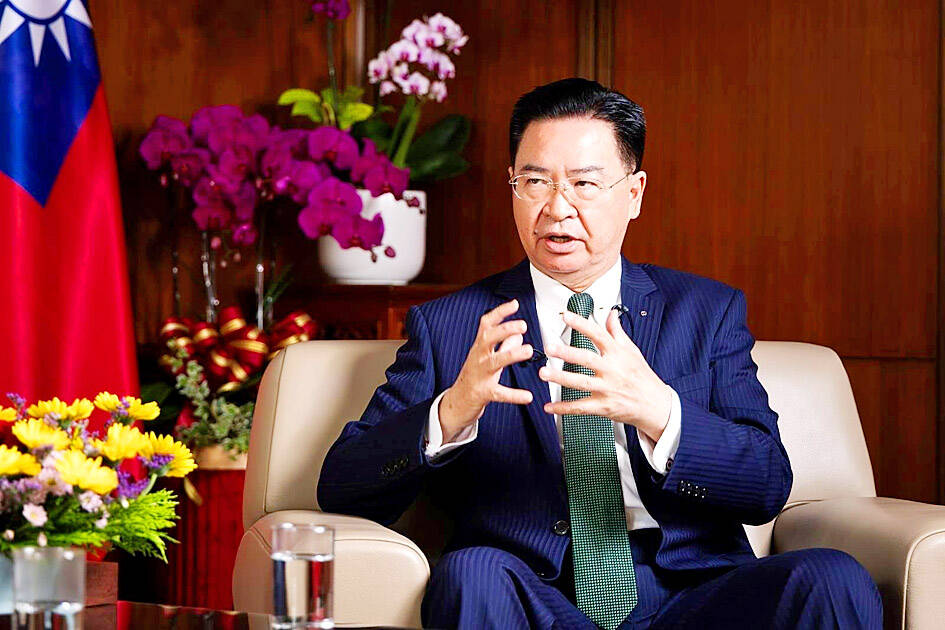The government is documenting its experiences with China’s alleged attempts to interfere in elections next week and is to publish its analysis soon after the vote, Minister of Foreign Affairs Joseph Wu (吳釗燮) said on Wednesday.
The government has pointed to military and economic pressure, as well as Chinese-subsidized trips to China for local Taiwanese officials, as evidence of Beijing’s interference ahead of the presidential and legislative elections on Saturday next week.
China’s Taiwan Affairs Office (TAO) has called the elections “purely an internal Chinese matter” and that the Democratic Progressive Party (DPP) is trying to call any kind of interactions between the two sides of the Taiwan Strait election interference.

Photo courtesy of the Ministry of Foreign Affairs
“The Chinese regime has made no bones about the purpose of its military coercion and trade manipulation. The message is clear: Taiwan’s voters must reject the ruling Democratic Progressive Party ticket of [Vice President William] Lai (賴清德) and Hsiao Bi-khim (蕭美琴), or else,” Wu wrote in the latest issue of The Economist. “The bluntness of the language shows that the government in Beijing is not afraid of being seen as a player in Taiwan’s national elections.”
Beijing is attempting to convince a minority of swing voters by “taking advantage of Taiwan’s openness,” flooding voters with disinformation and inviting grassroots officials on China tours, he wrote.
“In a tight race like this one, and with the concerted effort the PRC [People’s Republic of China] is making, it might just get its way,” he wrote.
However, Wu said that Taiwan is taking measures to counter this interference and is documenting its experiences, with analysis to be published shortly after the elections “in consultation with international experts.”
“Should China succeed in shaping the outcome of voting in Taiwan, it will apply the same tactics to other democracies to promote its preferred international order,” Wu wrote. “Democratic countries should never let this happen.”
He urged the international community to pay more attention to China’s efforts to undermine Taiwan’s democracy through influence and disinformation campaigns, as well as hybrid warfare, including cyberattacks — especially as Taiwan’s elections are just one of more than 40 to take place this year.
“Our desire is to turn Taiwan’s experience into a positive contribution to the rules-based international order, thereby helping the free world’s fight against authoritarian powers bent on eroding democratic systems,” Wu wrote. “It is our belief that democracy will prevail.”
Yesterday, the TAO in a statement responding to DPP accusations of election interference said that such attacks were the DPP’s “usual trick” in elections to shift the focus of attention away from the party’s own problems.
“These dirty and lame tricks are used too much, and they will only make themselves become a laughingstock,” it said.
Additional reporting by Kayleigh Madjar

The combined effect of the monsoon, the outer rim of Typhoon Fengshen and a low-pressure system is expected to bring significant rainfall this week to various parts of the nation, the Central Weather Administration (CWA) said. The heaviest rain is expected to occur today and tomorrow, with torrential rain expected in Keelung’s north coast, Yilan and the mountainous regions of Taipei and New Taipei City, the CWA said. Rivers could rise rapidly, and residents should stay away from riverbanks and avoid going to the mountains or engaging in water activities, it said. Scattered showers are expected today in central and

People can preregister to receive their NT$10,000 (US$325) cash distributed from the central government on Nov. 5 after President William Lai (賴清德) yesterday signed the Special Budget for Strengthening Economic, Social and National Security Resilience, the Executive Yuan told a news conference last night. The special budget, passed by the Legislative Yuan on Friday last week with a cash handout budget of NT$236 billion, was officially submitted to the Executive Yuan and the Presidential Office yesterday afternoon. People can register through the official Web site at https://10000.gov.tw to have the funds deposited into their bank accounts, withdraw the funds at automated teller

COOPERATION: Taiwan is aligning closely with US strategic objectives on various matters, including China’s rare earths restrictions, the Ministry of Foreign Affairs said Taiwan could deal with China’s tightened export controls on rare earth metals by turning to “urban mining,” a researcher said yesterday. Rare earth metals, which are used in semiconductors and other electronic components, could be recovered from industrial or electronic waste to reduce reliance on imports, National Cheng Kung University Department of Resources Engineering professor Lee Cheng-han (李政翰) said. Despite their name, rare earth elements are not actually rare — their abundance in the Earth’s crust is relatively high, but they are dispersed, making extraction and refining energy-intensive and environmentally damaging, he said, adding that many countries have opted to

PEACE AND STABILITY: Maintaining the cross-strait ‘status quo’ has long been the government’s position, the Ministry of Foreign Affairs said Taiwan is committed to maintaining the cross-strait “status quo” and seeks no escalation of tensions, the Ministry of Foreign Affairs (MOFA) said yesterday, rebutting a Time magazine opinion piece that described President William Lai (賴清德) as a “reckless leader.” The article, titled “The US Must Beware of Taiwan’s Reckless Leader,” was written by Lyle Goldstein, director of the Asia Program at the Washington-based Defense Priorities think tank. Goldstein wrote that Taiwan is “the world’s most dangerous flashpoint” amid ongoing conflicts in the Middle East and Russia’s invasion of Ukraine. He said that the situation in the Taiwan Strait has become less stable